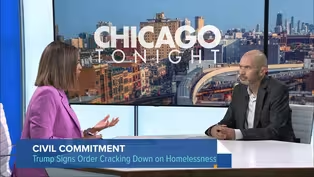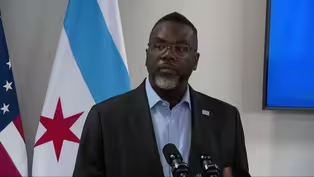
Advocates Push Back Against Cuts to Gender-Affirming Care for Youth
Clip: 7/29/2025 | 9m 41sVideo has Closed Captions
A number of hospitals have cut gender-affirming health care for transgender minors.
A number of hospitals have cut gender-affirming health care for transgender minors.
Problems playing video? | Closed Captioning Feedback
Problems playing video? | Closed Captioning Feedback
Chicago Tonight is a local public television program presented by WTTW
WTTW video streaming support provided by members and sponsors.

Advocates Push Back Against Cuts to Gender-Affirming Care for Youth
Clip: 7/29/2025 | 9m 41sVideo has Closed Captions
A number of hospitals have cut gender-affirming health care for transgender minors.
Problems playing video? | Closed Captioning Feedback
How to Watch Chicago Tonight
Chicago Tonight is available to stream on pbs.org and the free PBS App, available on iPhone, Apple TV, Android TV, Android smartphones, Amazon Fire TV, Amazon Fire Tablet, Roku, Samsung Smart TV, and Vizio.

WTTW News Explains
In this Emmy Award-winning series, WTTW News tackles your questions — big and small — about life in the Chicago area. Our video animations guide you through local government, city history, public utilities and everything in between.Providing Support for PBS.org
Learn Moreabout PBS online sponsorship>> Some local hospitals that have been on the forefront of providing gender affirming care to patients under the age of 19.
>> Have pulled back on those services, Lurie Children's Hospital announced in February they were no longer providing surgery for patients younger than 19 Rush University Hospital.
And you, Chicago medicine have also said they will cut some services for youth.
This move comes after President Trump signed an executive order seeking to stop federal support for gender affirming care for young people.
Joining us to discuss the local impact.
Our Shannon Parker CEO, a Brave Space Alliance and LGBTQ+ center on the South side as well as interim CEO of Equality, Illinois and Rage Wash art student at Northwestern's Feinberg School of Medicine.
We did also reach out to these hospitals.
We received a response from one of them will share that in just a moment.
Thanks to both of you for joining us reached let's start with you.
Please give us an idea of the range of services that are impacted for these young people.
Yeah.
So gender affirming care is a very broad term.
But I think what is being targeted right now specifically relates to both medication and surgical care.
>> So in terms of medication, there are a variety of different things that prescribers use mainly puberty blockers, which can pause puberty, allow young person reflect on their own identity.
Big decisions without having to go through that.
The very distressing changes that can occur when you go through puberty in a body that doesn't align with your identity.
So these are very reversible.
It could be used for children as they're entering into puberty for older teenagers.
We can also prescribe hormone therapy.
So because like testosterone or estrogen, and these will induce permanent changes to align their body you know, the gender that they view themselves as in terms of surgical services the king mastectomy is mainly for people under the age of 18.
There's practically no other surgeries that are done children and children under 18, 100's as adults.
Then, you know, then we're talking much more complex surgeries that can happen.
what do you think's important for minors with gender dysphoria to receive gender affirming care?
>> Well, research has shown time and time again that access to the scare is life-saving young people, especially young trans people really struggle with mental health and very high rates of anxiety and depression and numerous studies have shown that access to gender affirming care, but that that's hormone surgical or even just a social support network of providers can really reduce those rates and reduce the levels of suicidal intention self-harm and really some other like adverse mental health outcomes.
Shannon, what does this mean for the young people who had previously relied on these hospitals for the care they were getting?
>> You know what it means is for young people who were led on that care, but also the families.
It means that they're going to be left with a void of service provision, you know, in its most extreme and detrimental circumstance becoming that young returned back to black market treatments right?
It could mean that young people return to harmful medications in an attempt to, you know, alleviate the dysphoria that they're experiencing.
You know, it also means that young folks we'll have to potentially just turns again unsafe means.
But also what I will say to his head.
It means that the care providers who have provided care to these young people may also face repercussions.
What looks like.
Legal charges on whether that looks like the potential of imprisonment finding so many things, right.
So right now, the young people, but also the care providers.
I had a great deal of risk in this moment.
You say for the care providers, should they provide the care?
That absolutely right.
That we did get a statement, as I mentioned from Rush University Medical Center on and they say, quote, Rush has paused on offering formal care.
>> 2 new patients under the age of 18.
This decision was made in collaboration with our clinical leaders rushed does not provide surgical treatment to patients under 18 years of age.
Such surgeries for minors have not occurred at Rush since 2023.
It goes on to say our expert clinical team will provide more detailed information to patients and families based on their specific medical needs.
Rush continues to be strong advocate for the LGBTQ+ community.
Shannon, what's your response to that?
>> Well, you know, the main thing that.
The main point is they young people are gonna find themselves without care that they've been receiving for years.
Right?
We're going to see young people who potentially self-harm.
You know, we're going to see young people who have a reversal of really positive health outcomes that they've been experiencing.
You know, in previous years.
This is just really a huge setback for the young folks, but also for the families of young people who hospital psych rash, universal Chicago have been providing care to.
>> ridge.
There's been reporting that some young patients have had their appointments for services canceled at Northwestern Memorial Hospital.
We did reach out to them.
Haven't received a response just yet.
But what would it mean to patients that have already started care and have had their care to be halted?
What would that mean I mean, I think it's a devastating blow to anyone to Get your expectations up to have such an impactful procedure medication.
>> And really, to have that taken away from you.
I don't speak on behalf of Northwestern Medicine, but I do know that, you know, hospitals are in a very difficult place right now.
As Shannon mentioned.
And I think that it's it's really just putting the strain on on the families and the children who are going to suffer from this.
Many European countries, which have also been on the forefront of gender affirming care for minors.
They've also been pulling back but more due to questions about the benefits and risks of such care.
>> Richie believe that there are any legitimate questions that are being raised on.
And what do you think or sort of the best ways to assess the benefits and the risk?
>> I mean, I think with any medical intervention, there are questions things that should be explored.
I think the biggest concern for the European Union countries that just that we don't have long-term data on a lot of these medications.
But there are lots of new medical advancements that we don't have long-term data on.
So I think when we're thinking about whether or not prescribe this medication for a patient, we're really waiting the cute mental distress that they might be now going through puberty in a body that doesn't align with who they are versus long-term effects down the road that we may have.
No new medical into interventions to treat.
So I think that there's some caution in the EU because of that lack of long-term data.
But really what they're emphasizing its to take a more personal holistic approach, which is what we already do here in the United States.
Shannon universities, as we know, are facing similar choices, right?
Either do what the Trump administration is asking of them or face losing billions of dollars in federal funding.
>> Is there another way for hospitals which also received billions of dollars in federal funding in the form of Medicaid, Medicare, maybe research grants.
Is there some other way for them to respond to the administration?
Because for some time admit universities were doing what they could and then some of them are are having finding themselves making a deal with the administration begin.
Hang on to that money.
>> And so hard, right?
Is that?
This administration is literally using trans people as a bargaining chip right?
>> we in Illinois.
>> Are fortunate, if you will, to be a safe state, right.
But that being a safe state is only as good to infrastructures within the state that can provide the supports that folks need, you know, so going back to your question.
Hospital simply cannot last without Medicaid funding, but also to the scores of other individuals who seek supports from hospitals, cancer, support's, diabetes, all the other.
emergency supports.
I mean.
The hospital's, the communities, the patients.
Simply.
would be devastated rate.
So again, what cool moment that we're in when this administration, it's literally leveraging billions of dollars against hospitals all in the name of providing.
Safety, if you will, for trans people, which is the furthest thing that they're providing.
Rachel whats the alternative for families and the young people who had been a friend hope to receive care from these hospitals is out of country or a realistic option.
>> I mean, I think that that really depends on the situation of families I know that there at cross roots movements here in Illinois for providers who don't receive money from the federal government come together and provide emergency services for these people.
But obviously kind of at a critical moment where there are many young people being left left out in the dark with no access to the services.
So I think that this might look like traveling to different states for people for whom that's financially accessible.
And I think that really means the burden falls on those who didn't have any
Fire at North Side Homeless Encampment Reignites Safety Concerns
Video has Closed Captions
Clip: 7/29/2025 | 7m 26s | Officials are planning to remove the encampment along the North Shore Channel. (7m 26s)
Johnson Says New Taxes for Big Companies ‘On the Table’
Video has Closed Captions
Clip: 7/29/2025 | 2m 52s | The Chicago mayor's administration is preparing to confront a likely budget deficit of $1.2 billion. (2m 52s)
Ryne Sandberg Appears on WTTW's 'Time Out' in 1984
Video has Closed Captions
Clip: 7/29/2025 | 3m 8s | The Hall of Fame second baseman and former Chicago Cubs player died at 65. (3m 8s)
Providing Support for PBS.org
Learn Moreabout PBS online sponsorship
- News and Public Affairs

Top journalists deliver compelling original analysis of the hour's headlines.

- News and Public Affairs

FRONTLINE is investigative journalism that questions, explains and changes our world.












Support for PBS provided by:
Chicago Tonight is a local public television program presented by WTTW
WTTW video streaming support provided by members and sponsors.


